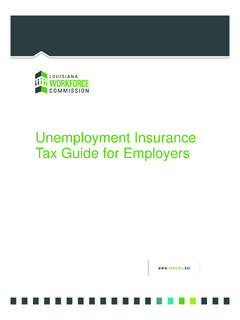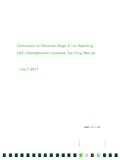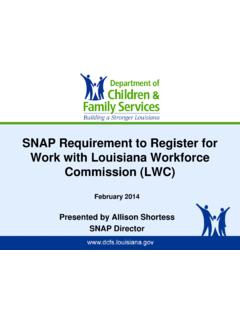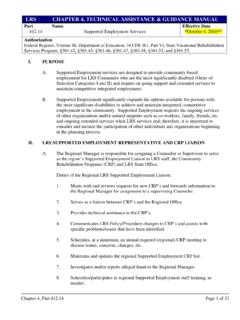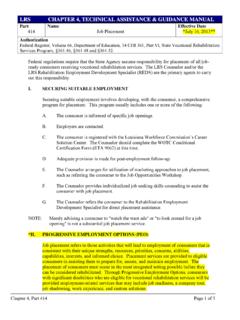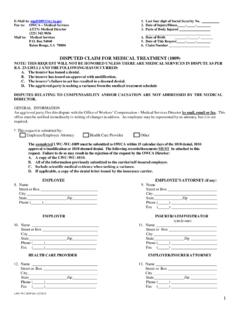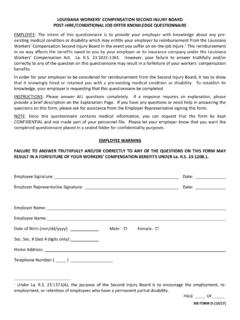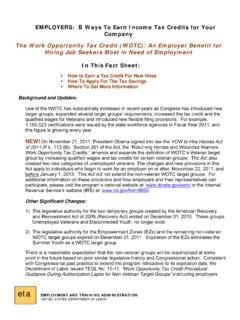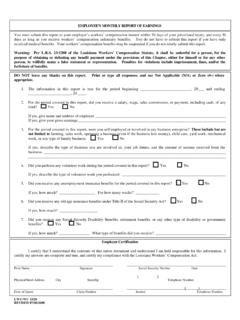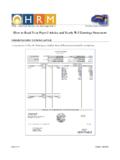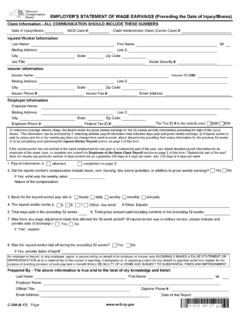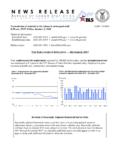Transcription of Rights & Responsibilities for Employees & Employers: | 1 …
1 Rights & Responsibilities for Employees & employers : Page | 1 Rights AND Responsibilities FOR Employees AND employers - This Office of Workers Compensation Administration s Rights and Responsibilities brochure is sent in compliance with Title 23 of the 1307. For questions, please contact: Records Management, Office of Workers Compensation Administration (OWCA), Louisiana Workforce Commission (LWC), 1001 N 23rd St, Room G28, PO Box 94040, Baton Rouge, LA 70804-9040 800-201-3457 toll free; 225-342-7565 phone; 225-342-7582 fax WHAT IS WORKERS COMPENSATION? Workers compensation is a legal remedy whereby an employee who is injured on the job may be entitled to certain benefits. The benefits can include medical care for the injury, indemnity wage benefits, vocational rehabilitation services, and/or death benefits. These benefits are the obligation of the employer and are paid directly to the employee by the employer or its workers compensation insurer.
2 Every employer, unless statutorily exempted, is responsible for the medical care and the payment of indemnity wage benefits to any employee who is injured while in the course and scope of his or her employment. WHO IS COVERED BY THE WORKERS COMPENSATION LAW? Most Employees in Louisiana are covered from the day they start employment. Employees may be full-time, part-time, seasonal, or minors. Subcontractors and certain independent contractors may be considered Employees if they are involved in the pursuit of the employer s trade, business or occupation or if they are performing substantial manual labor. The law does contain some limited exemptions. Domestic Employees , most real estate salespersons, uncompensated officers and directors of certain non-profit organizations, and public officials are specifically exempted. Most volunteer workers would not be entitled to benefits.
3 employers are required to have workers compensation insurance or to be approved to self-insure. If any employee has r eason to believe that his or her employer is not covered or if the employer requires an employee to pay for or purchase a workers compensation insurance policy, this violation should be reported to the Office of Workers Compensation Administration (OWCA) Fraud & Compliance section at toll free 1-800-201-3362. Within 10 days of actual knowledge of an on the job injury resulting in death or lost time in excess of one week, the employer must report the injury to their insurer on a Form LWC-WC IA-1 (First Report of Injury or Illness). The insurer will then submit the report to the OWCA. Any employer that fails to report such an injury to its workers compensation insurer or to the OWCA is subject to a penalty for failure to do so. THE OFFICE OF WORKERS COMPENSATION ADMINISTRATION The Office of Workers Compensation Administration (OWCA) was created in 1983 within the Louisiana Department of Labor (now the Louisiana Workforce Commission) to administer the provisions of the Louisiana Workers Compensation Act.
4 The OWCA investigates allegations of fraud; monitors compliance with the requirement that employers insure their workers compensation obligation; compiles information regarding workers compensation claims; resolves disputes over the necessity, advisability, and cost of hospital care or services, as well as conflicts concerning medical, surgical and Rights & Responsibilities for Employees & employers : Page | 2 non-medical treatment; provides Occupational Safety & Health Administration (OSHA) consultation services; and assists Louisiana employers in the development and implementation of a safety management plan in their workplace. The OWCA, however, does not pay any benefits to Employees as a result of a covered on the job injury. The OWCA has exclusive original jurisdiction to resolve disputes in workers compensation matters. There are ten district offices located throughout the state (see attached list) where disputed claims for compensation are filed and which provide the framework for the resolution of disputes regarding claims for benefits, the entitlement to benefits, or other relief under the Louisiana Workers Compensation Act.
5 WHAT INJURIES ARE COVERED BY THE WORKERS COMPENSATION LAW? The law covers both mental and physical injuries from either accidents or occupational diseases. However, a mental injury must be the result of a physical injury or of a sudden, unexpected and extraordinary stress related to the employment and in either case must be proved by clear and convincing evidence. An accident is defined by the Louisiana Workers Compensation Act as an unexpected or unforeseen actual, identifiable, precipitous event happening suddenly or violently, with or without human fault, and directly producing at the time objective findings of an injury which is more than simply a gradual deterioration or progressive degeneration. An occupational disease is defined by the Louisiana Workers Compensation Act as only that disease or illness which is due to causes and conditions characteristic of and peculiar to the particular trade, occupation, process, or employment in which the employee is exposed to such disease.
6 The event causing the injury must arise out of and be within the course and scope of the employee s employment. Generally, the fault of the employer or Employees does not affect the compensability of an injury. However, no compensation may be allowed if the injury was caused by the employee s willful intention to injure himself/herself or others; or by the injured employee s intoxication at the time of the injury, unless resulting from activities in pursuit of the employer s interests or from activities in which the employer procured and encouraged the use of the beverage or substance. An employee may not be entitled to benefits if he is the aggressor in an unprovoked physical altercation. The employee may not be entitled to benefits if it is determined that he/she was a participant in horseplay at the time that the injury occurred. HOW ARE INDEMNITY BENEFITS PAID? An employee who suffers a covered injury may be entitled to weekly/ monthly indemnity benefits if the injury prevents the employee from returning to work for more than seven calendar days.
7 The first installment of benefits payable for Temporary Total Disability (TTD), Permanent Total Disability (PTD) or death shall become due on the fourteenth day after the employer or insurer has knowledge of the injury or death. No compensation shall be paid for the first week after the injury occurs unless the disability from the injury continues for two weeks or longer after the date of the accident. This waiting period indemnity payment shall be paid after the first two weeks have elapsed. Rights & Responsibilities for Employees & employers : Page | 3 During the period of Temporary Total Disability (TTD), the employer or its workers compensation insurer is responsible for the payment of indemnity benefits to the employee in an amount equal to sixty-six and two-thirds percent of the employee s average weekly wage, subject to a maximum/minimum benefit amount set by the OWCA. Maximum/minimum indemnity benefits are determined according to the date of the accident causing the injury and are not adjusted annually for increases or decreases in the maximum/minimum benefit amount set by the OWCA.
8 (See attached list). An employee who suffers a covered injury may be entitled to Supplemental Earnings Benefits (SEB) if that employee is able to return to work, but is unable to earn at least ninety percent of the pre-injury wage. Supplemental Earnings Benefits are calculated as sixty-six and two-thirds percent of the difference between the pre-injury average monthly wages and the average monthly wage the employee is capable of earning, subject to the maximum/minimum benefit amount set by the OWCA. Supplemental Earnings Benefits are payable on a monthly basis u nless the employee is not receiving any income from employment or self-employment and the employer has not established earning capacity. In that case, the employee may be paid weekly SEB. In either case, SEB is payable for a maximum of 520 weeks including the time for which other indemnity benefits were paid. If the employee dies within two years of the last treatment as the result of any job-related accident, his or her surviving spouse and/or dependent child(ren) (or other dependents) may be entitled to weekly indemnity benefits pursuant to the Louisiana Workers Compensation Act.
9 If there are no surviving dependents, the employee s surviving parents are entitled to a one-time benefit of $75,000 each. The employer or its workers compensation insurer shall also pay, in addition to any other benefits, reasonable expenses of the burial of the employee , not to exceed $8,500. An employee is entitled to a one-time payment of $50,000 if the injury is determined to be catastrophic. Only the following injuries shall be considered injuries which are catastrophic: Paraplegia or quadriplegia or the total anatomical loss of both hands, both arms, both feet, both legs, both eyes, or one hand and one foot, or any two thereof. Functional loss or loss of use shall not constitute anatomical loss. If the employee applies for and subsequently receives Social Security disability benefits, employer-provided disability plan benefits, or Social Security Old Age Retirement benefits, his or her workers compensation indemnity benefits may be reduced in accordance with the Louisiana Workers Compensation Act.
10 This is not a simple dollar for dollar reduction and must be calculated individually according to the employee s circumstance. In addition, an employee is not entitled to receive workers compensation indemnity benefits and unemployment insurance benefits at the same time. On the same day as the first payment of indemnity is made to the employee or on or before the effective date of any modification (which may include a change from TTD to SEB benefits), suspension, termination, or controversion of indemnity/medical benefits, a F orm LWC-WC 1002 (Notice of Payment, Modification, Suspension, Termination, or Controversion of Compensation or Medical Benefits/Notice of Disagreement) shall be completed by the employer/payor and sent to the injured employee by certified mail, and to the employee s attorney, if applicable, by facsimile. The employer/payor shall also send a copy of the Form LWC-WC 1002 to the OWCA within 10 days from the date the original Form LWC-WC 1002 was sent to the injured employee .
